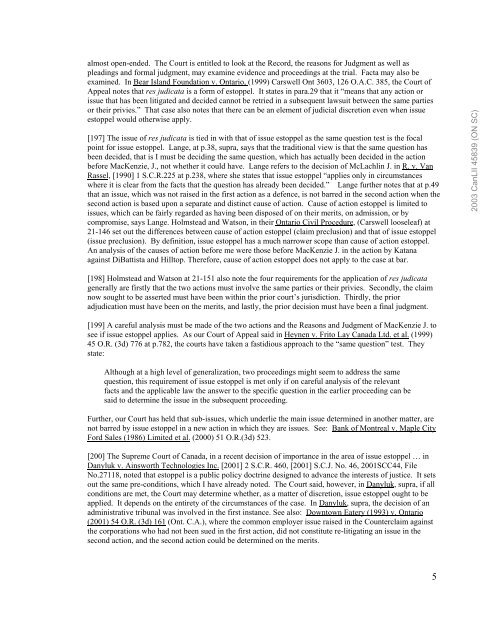court of appeal for ontario - academicfreedom.ca
court of appeal for ontario - academicfreedom.ca
court of appeal for ontario - academicfreedom.ca
Create successful ePaper yourself
Turn your PDF publications into a flip-book with our unique Google optimized e-Paper software.
almost open-ended. The Court is entitled to look at the Record, the reasons <strong>for</strong> Judgment as well as<br />
pleadings and <strong>for</strong>mal judgment, may examine evidence and proceedings at the trial. Facta may also be<br />
examined. In Bear Island Foundation v. Ontario, (1999) Carswell Ont 3603, 126 O.A.C. 385, the Court <strong>of</strong><br />
Appeal notes that res judi<strong>ca</strong>ta is a <strong>for</strong>m <strong>of</strong> estoppel. It states in para.29 that it “means that any action or<br />
issue that has been litigated and decided <strong>ca</strong>nnot be retried in a subsequent lawsuit between the same parties<br />
or their privies.” That <strong>ca</strong>se also notes that there <strong>ca</strong>n be an element <strong>of</strong> judicial discretion even when issue<br />
estoppel would otherwise apply.<br />
[197] The issue <strong>of</strong> res judi<strong>ca</strong>ta is tied in with that <strong>of</strong> issue estoppel as the same question test is the fo<strong>ca</strong>l<br />
point <strong>for</strong> issue estoppel. Lange, at p.38, supra, says that the traditional view is that the same question has<br />
been decided, that is I must be deciding the same question, which has actually been decided in the action<br />
be<strong>for</strong>e MacKenzie, J., not whether it could have. Lange refers to the decision <strong>of</strong> McLachlin J. in R. v. Van<br />
Rassel, [1990] 1 S.C.R.225 at p.238, where she states that issue estoppel “applies only in circumstances<br />
where it is clear from the facts that the question has already been decided.” Lange further notes that at p.49<br />
that an issue, which was not raised in the first action as a defence, is not barred in the second action when the<br />
second action is based upon a separate and distinct <strong>ca</strong>use <strong>of</strong> action. Cause <strong>of</strong> action estoppel is limited to<br />
issues, which <strong>ca</strong>n be fairly regarded as having been disposed <strong>of</strong> on their merits, on admission, or by<br />
compromise, says Lange. Holmstead and Watson, in their Ontario Civil Procedure, (Carswell looseleaf) at<br />
21-146 set out the differences between <strong>ca</strong>use <strong>of</strong> action estoppel (claim preclusion) and that <strong>of</strong> issue estoppel<br />
(issue preclusion). By definition, issue estoppel has a much narrower scope than <strong>ca</strong>use <strong>of</strong> action estoppel.<br />
An analysis <strong>of</strong> the <strong>ca</strong>uses <strong>of</strong> action be<strong>for</strong>e me were those be<strong>for</strong>e MacKenzie J. in the action by Katana<br />
against DiBattista and Hilltop. There<strong>for</strong>e, <strong>ca</strong>use <strong>of</strong> action estoppel does not apply to the <strong>ca</strong>se at bar.<br />
[198] Holmstead and Watson at 21-151 also note the four requirements <strong>for</strong> the appli<strong>ca</strong>tion <strong>of</strong> res judi<strong>ca</strong>ta<br />
generally are firstly that the two actions must involve the same parties or their privies. Secondly, the claim<br />
now sought to be asserted must have been within the prior <strong>court</strong>’s jurisdiction. Thirdly, the prior<br />
adjudi<strong>ca</strong>tion must have been on the merits, and lastly, the prior decision must have been a final judgment.<br />
[199] A <strong>ca</strong>reful analysis must be made <strong>of</strong> the two actions and the Reasons and Judgment <strong>of</strong> MacKenzie J. to<br />
see if issue estoppel applies. As our Court <strong>of</strong> Appeal said in Heynen v. Frito Lay Canada Ltd. et al. (1999)<br />
45 O.R. (3d) 776 at p.782, the <strong>court</strong>s have taken a fastidious approach to the “same question” test. They<br />
state:<br />
Although at a high level <strong>of</strong> generalization, two proceedings might seem to address the same<br />
question, this requirement <strong>of</strong> issue estoppel is met only if on <strong>ca</strong>reful analysis <strong>of</strong> the relevant<br />
facts and the appli<strong>ca</strong>ble law the answer to the specific question in the earlier proceeding <strong>ca</strong>n be<br />
said to determine the issue in the subsequent proceeding.<br />
Further, our Court has held that sub-issues, which underlie the main issue determined in another matter, are<br />
not barred by issue estoppel in a new action in which they are issues. See: Bank <strong>of</strong> Montreal v. Maple City<br />
Ford Sales (1986) Limited et al. (2000) 51 O.R.(3d) 523.<br />
[200] The Supreme Court <strong>of</strong> Canada, in a recent decision <strong>of</strong> importance in the area <strong>of</strong> issue estoppel … in<br />
Danyluk v. Ainsworth Technologies Inc. [2001] 2 S.C.R. 460, [2001] S.C.J. No. 46, 2001SCC44, File<br />
No.27118, noted that estoppel is a public policy doctrine designed to advance the interests <strong>of</strong> justice. It sets<br />
out the same pre-conditions, which I have already noted. The Court said, however, in Danyluk, supra, if all<br />
conditions are met, the Court may determine whether, as a matter <strong>of</strong> discretion, issue estoppel ought to be<br />
applied. It depends on the entirety <strong>of</strong> the circumstances <strong>of</strong> the <strong>ca</strong>se. In Danyluk, supra, the decision <strong>of</strong> an<br />
administrative tribunal was involved in the first instance. See also: Downtown Eatery (1993) v. Ontario<br />
(2001) 54 O.R. (3d) 161 (Ont. C.A.), where the common employer issue raised in the Counterclaim against<br />
the corporations who had not been sued in the first action, did not constitute re-litigating an issue in the<br />
second action, and the second action could be determined on the merits.<br />
5<br />
2003 CanLII 45839 (ON SC)



